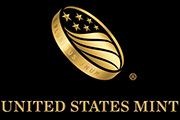Print Friendly
Coin dealers and grading services may use these terms in varying ways. Some base their use on the dates appearing on United States Mint product packaging or packing slips, or on the dates of product releases or ceremonial coin strike events. Consumers should carefully review this information along with each dealer's or grading service's definition of "first strike" or "first release" when considering a purchase of coins with these designations.
The United States Mint has never produced or sold colorized coins or gold- or silver-plated coins. However, many businesses purchase genuine United States coins and then plate them in a thin layer of gold or silver or use a variety of methods to "colorize" the coins. The most common colorization techniques involve painting an enamel finish on the coin or applying a holographic or superimposed image to the coin.
Each year a small number of foreign governments issue coins with designs that feature subjects from United States culture and history, such as U.S. Presidents and the September 11, 2001 terrorist attacks. Few, if any, of these coins, appear to be marketed within the country that issued them. It is important to note that even if they are denominated as "dollars," they are not designed or manufactured by the United States Mint, and they are not United States legal tender. They are promoted by private businesses in the United States for sale through newspaper, television and web advertisements.
Some businesses produce copies or replicas of genuine U.S. coins. In many instances, the replicas are virtually identical to genuine U.S. coins. Thus, it can be extremely difficult for consumers to detect the difference prior to purchase. The Hobby Protection Act requires that all imitation coins and other numismatic items be permanently marked with the word "COPY". However, some businesses in China are producing unmarked imitations of pre-1950 United States coins and are selling them on-line. In addition, some business sell unmarked “giant” or miniature replicas of U.S. coins.
Information about products, plus other coin-related issues that may be of interest to our customers and to the general public.
Check Out the Business
Before purchasing coins or coin-related products from a business that you are not familiar with, contact your state Attorney General’s Office
(www.naag.org), local consumer protection agency
(www.consumeraction.gov), and your local Better Business Bureau
(www.bbb.org).
They can tell you if consumers have filed complaints against the retailer or online service.

